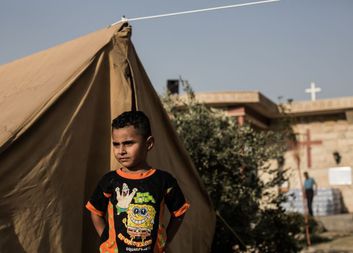On Monday the 17th of October the battle for Mosul, the last stronghold of the Islamic State in Iraq, burst open. It is believed that up to 8,000 ISIS fighters are struggling against the government who owns the numerical advantage of 25,000 soldiers. Civilians were warned of the imminent attack by thousands of leaflets and flyers. The United Nations has expressed its concerns about the safety of up to one and a half million people. Though the exact number is unknown, two million inhabitants had been living in the city before the extremists began their occupation in 2014.
The Iraqi government has recommended that local citizens stay in their homes throughout the fighting. If they escape they risk the threat of crossfire, sniper attacks or explosives. Analysts worry that Islamic State militants will deploy chemical weapons, use civilians as shields, drive them into traps or capture them as hostages. Reuters has already confirmed that fighters have hampered people trying to leave the city and have forced them to enter buildings that might become the target of air raids.
The operation to retake the capital of the northern Nineveh province is estimated to take several weeks and months. So far 130,000 people have escaped from the city and humanitarian organizations are preparing for another million refugees to leave. The provision of help has been complicated by both the extremely high number of people in need and the inability to predict where they might take shelter. Moreover, even the fighters themselves may try to escape, which also increases the number of security measures taken and slows down preparation. Only a few refugee camps are currently able to receive displaced people. There are concerns that informal camps in undignified conditions without access to humanitarian aid will arise spontaneously.
Caritas Iraq has been preparing food and material packages, providing sanitation facilities and drinking water, building new shelters and establishing camps. The organisation has focused its efforts on the route leading south into central Iraq and north to the autonomous Kurdistan and province of Tamim. Although Caritas has anticipated a similar situation since February, when the Iraqi government began to plan an attack on Mosul, the assistance capacity for the estimated number of internally displaced people is still insufficient.
The Prague headquarters of Caritas Czech Republic has also been monitoring the situation in the country. "We see what is happening and are ready to respond quickly. We are considering sending our own emergency aid team," said Benjamin Mlýnek, Middle East Program Manager of Caritas Czech Republic.
Caritas Czech Republic has been operating in Iraq since 2015, when it first started providing humanitarian aid packages (food, clothes and utensil) and ensuring access to medicines and health care. In 2016 it moved from the original area of Erbíl and Dohúk to the province of Baghdad.
You can also provide a fast assistance to victims of the current crisis in Iraq by a financial contribution to the account number of 55660022/0800, VS 180. Thank you so much to all our donors!







